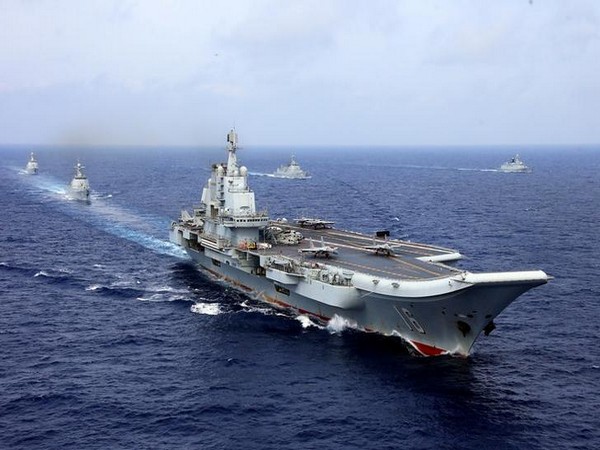Indian border tensions echo Beijing's South China Sea Shenanigans
Chinese activities along the Sino-Indian border eerily mimic what has been happening in the South China Sea for nearly a decade. It is thus illustrative to look at the latter to predict what may happen in the former, as events happen against a backdrop of plummeting international trust in Chinese intentions.

Hong Kong: Chinese activities along the Sino-Indian border eerily mimic what has been happening in the South China Sea for nearly a decade. It is thus illustrative to look at the latter to predict what may happen in the former, as events happen against a backdrop of plummeting international trust in Chinese intentions.
Illustrating the strained relation, a recent couple of weeks saw the US Navy exercising two aircraft carrier strike groups in the South China Sea, much to Beijing's chagrin. However, such an occasion is rare and must of necessity be temporary. By 18 July, the Nimitz Strike Group had passed on through the Malacca Strait, heading towards the Indian Ocean.
The UK has also intimated that its carrier HMS Queen Elizabeth will sail in the South China Sea next year, exercising with American and Japanese warships. Again, such a presence is at best brief, although it does express consternation in London about Chinese activities there.
Before looking at similarities between the South China Sea and the Indian border, we may quickly sum up the situation in the territorially disputed maritime area.
Lynn Kuok is the Shangri-La Dialogue Senior Fellow for Asia-Pacific Security at the UK-based International Institute for Strategic Studies (IISS). Speaking in a webinar hosted by the Australian Institute of International Affairs (AIIA) on 25 June, Kuok said Chinese activities in the South China Sea have arguably intensified since COVID-19 struck. She asserted, "This is something that should concern us all. First, because it's not merely a dispute over rocks and reefs as some like to say, but it's something that affects the balance of power in the region. And the second reason it should concern us is that the rules-based order is being undermined, and this doesn't just affect the South China Sea and the US, China, but it affects global order and the ability to ensure stability, not just regionally but internationally. So we should all care about what happens in the South China Sea."
Also Read |
Xi Jinping departs for India to attend informal meet with PM Modi
In 2013 the Philippines brought a case against China, and a decision was delivered overwhelmingly in Manila's favor on 12 July 2016. Kuok noted that the tribunal was never designed to rule on ownership of maritime features, but rather to clarify resource rights. The Nine-Dash Line only made its first official presence when China submitted it to the United Nations in 2009. She said that Chinese actions and comments tend to represent a claim to everything within the dashed line.
China's broader aims there are "to mainly achieve strategic depth and reach to defend against adversaries, as well as to protect access to the critical Malacca Strait". Non-traditional advantages are deterring regional countries from putting up a strong resistance to Chinese activities, and greatly undermined US credibility in the region. Kuok said the prevailing view in the region is that, "while the United States was asleep at the wheel, China presented the world with a fait accompli".
An op-ed in the Hong Kong-based South China Morning Post, which now leans heavily in support of the Communist Party of China (CCP), recently asserted, "The narrative of China as an existential threat and system breaker is false."
However, that defense is patently untrue at worst, or disingenuous at best. China has deliberately spurned international law by belittling the Permanent Court of Arbitration's 2016 verdict on the South China Sea, even though it is binding upon China under international law. It has also trampled upon the Sino-British Joint Declaration over Hong Kong, a document lodged with the UN. In retaliation for the arrest of Huawei's chief financial officer in Canada, the CCP arbitrarily detained two Canadians. It has bullied fishermen in the South China Sea, as well as infringed upon others' rights by surveying in their exclusive economic zones.
China has used "tourism terrorism" to coerce nations with which it has disagreements. It has conducted espionage and cyber-theft to steal commercial and government information. It has used the United Work Front Department to influence public opinion and politicians overseas. These are but a few of the ways that China has attempted to "break the system" and impose its point of view or will on others.
Also Read |
Jaishankar meets Chinese VP, discusses strengthening of ties
So what lessons could India learn from Chinese actions in the South China Sea?
We learn, first of all, that China is more willing to rub neighbors up the wrong way, and nowadays to even make enemies. Beijing has been more willing to do this since COVID-19 rocketed around the globe, as its reputation was already in tatters.
Secondly, moving on, Kuok said: "What we've also seen is China's objections to assertions of maritime rights and freedoms by the United States and its allies in the South China Sea.
 Dynamite News
Dynamite News 